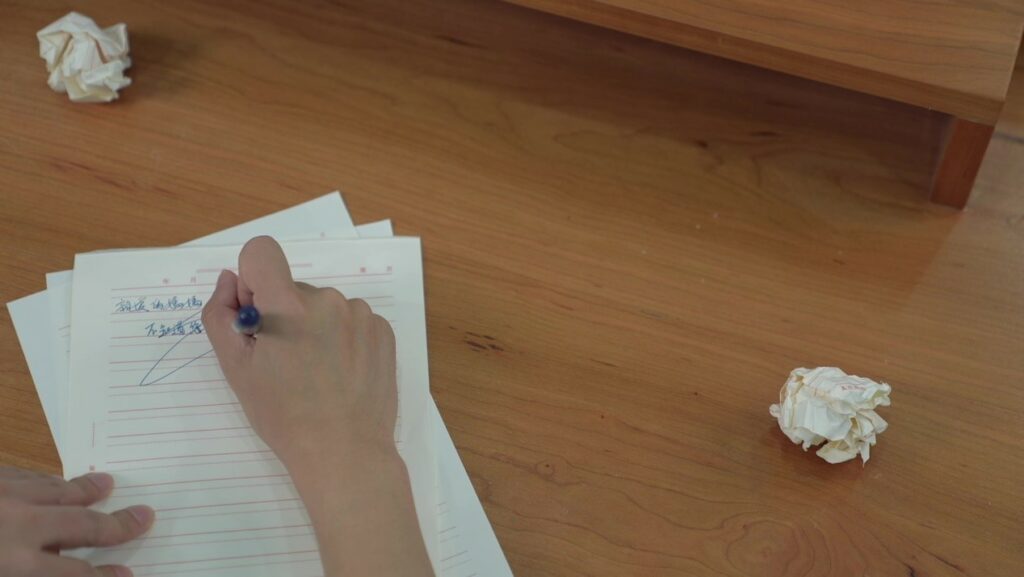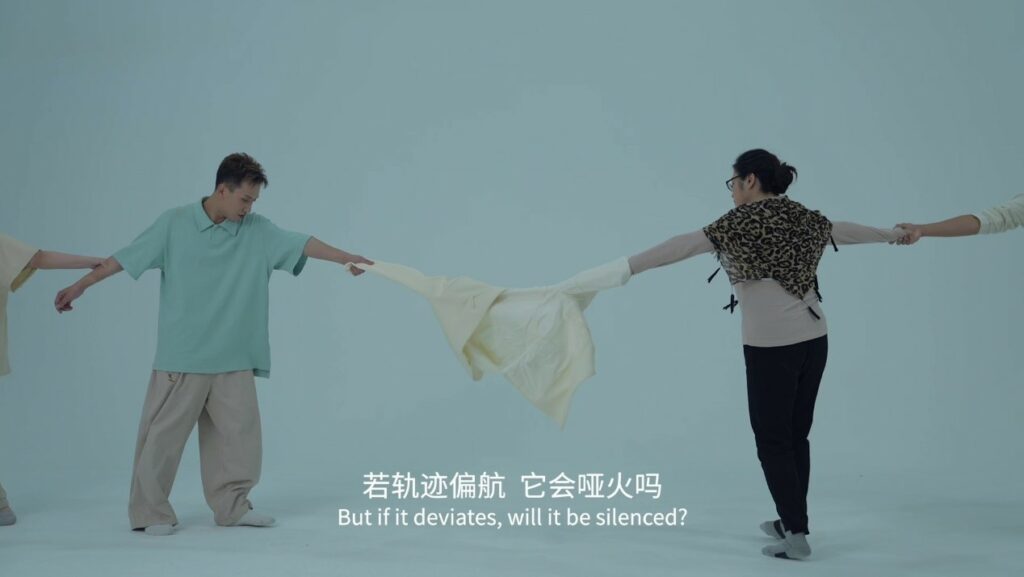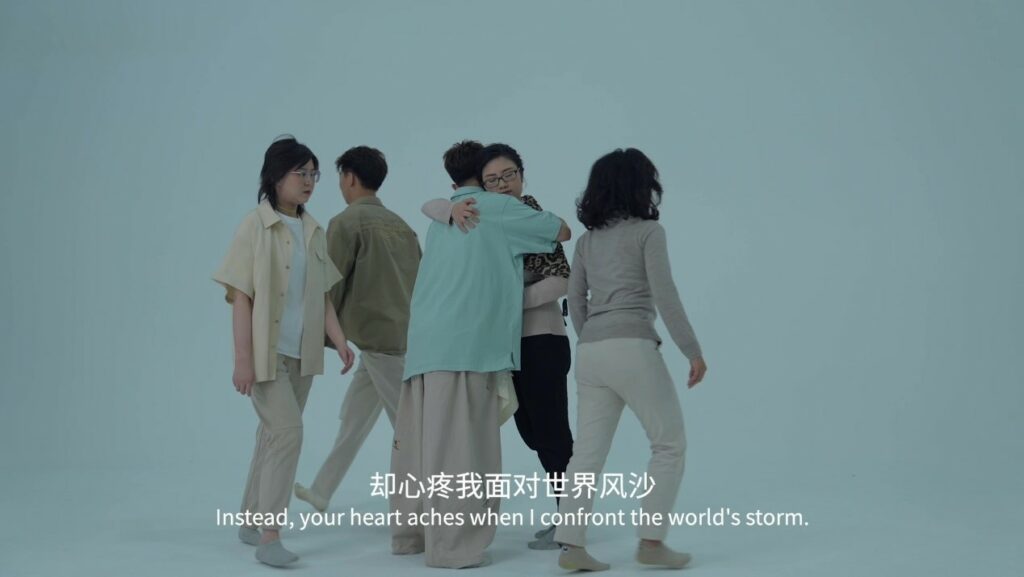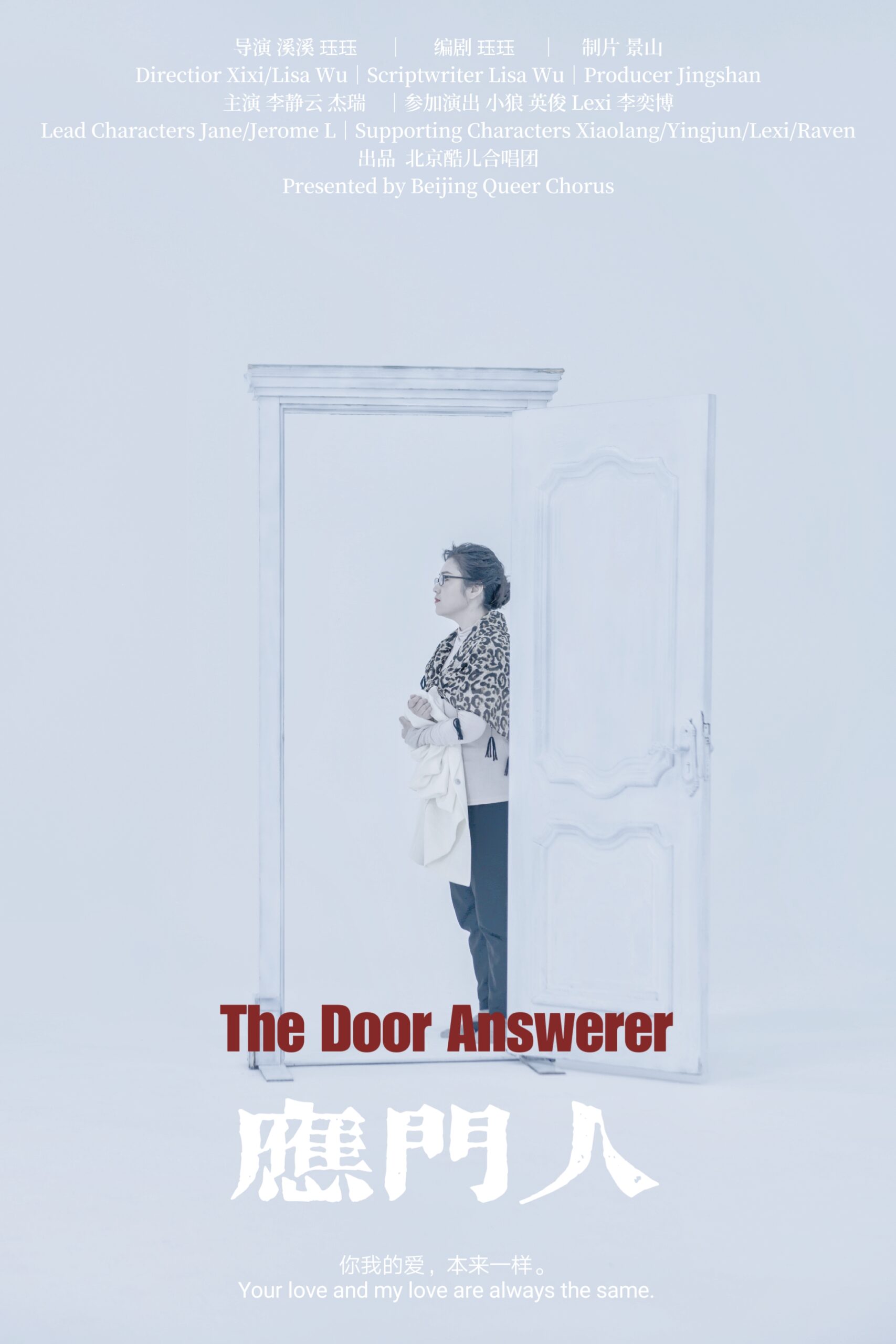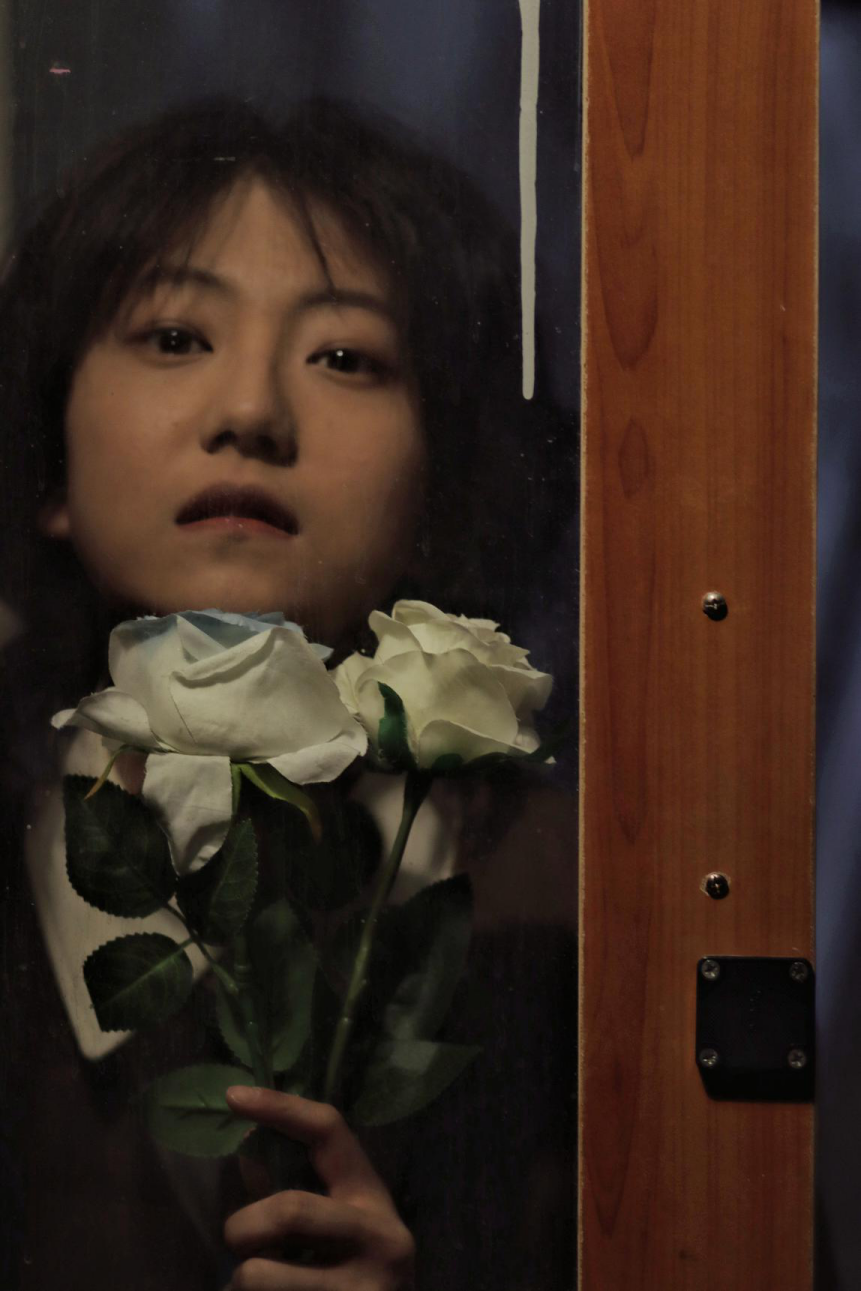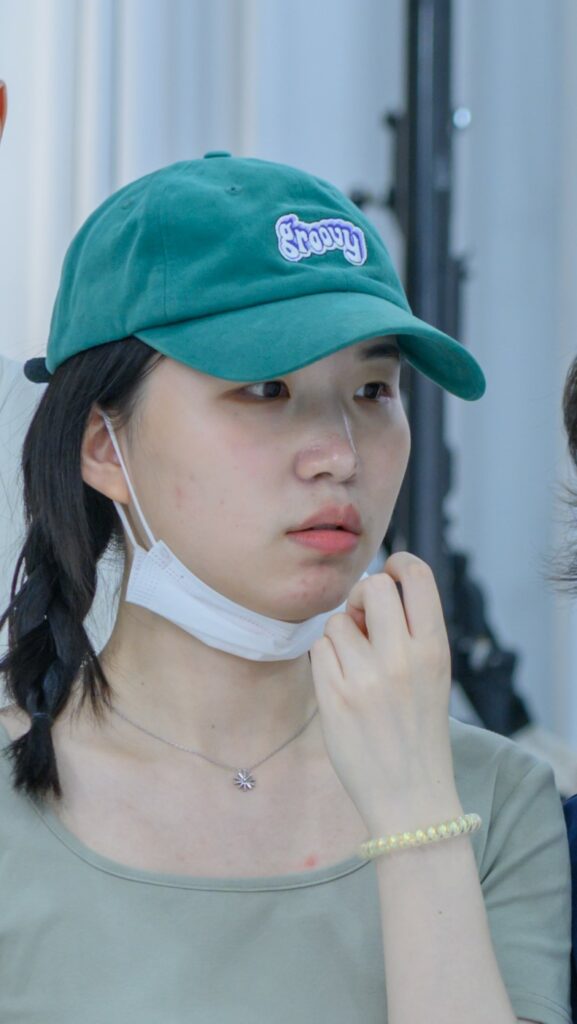导演:溪溪、珏珏
编剧:珏珏
主演:李静云、杰瑞 Baranov
制片人:景山
摄影:可可
类型:音乐影片
时长:5分钟
完成时间:2023
对白语言:汉语普通话
地区:中国
制片公司:北京酷儿合唱团
Director: Xixi, Lisa Wu
Screenwriter: Lisa Wu
Cast: Jane, Jerome L
Producer: Jingshan
Cinematographer: Keke
Genre: Music Video
Length: 5min
Year: 2023
Dialogue: Mandarin Chinese
Region: China
Production Company: Beijing Queer Chorus
故事梗概 Synopsis
“门的那一边,你好像藏了什么……”细心的母亲发现,从某一个时间开始,儿子不再无话不谈,一层阴翳笼罩在儿子的房间。为了打开这扇横亘在两代人中间的门,母亲和儿子都付出了努力,内心的情绪斗争与外界的流言蜚语都没有打败他们。而他们在互诉衷肠后,发现“你我的爱,本来一样”,爱最终能消弭世界上一切误解与隔阂。
” You seem to hide something on the other side of the door….” The attentive mother noticed that, from a certain point in time, her son stopped sharing everything and a layer of shadow hung over his room.In order to unlock this door that stood between the two generations, both the mother and the son put in efforts; their internal emotional struggles and the external rumors didn’t defeat them. After confiding in each other, they discovered that “your love and my love, they were always the same.” Love, in the end, has the power to dispel all misunderstandings and barriers in the world.
导演介绍 Director’s Biography
溪溪,青年导演,北京师范大学艺术与传媒学院硕士研究生在读,专业为戏剧与影视学,主修影视创作。
Xixi, a young director and a current master’s student in the School of Arts and Media at Beijing Normal University. She is pursuing a degree in Drama and Film Studies, with a specialization in film and television production.
导演阐述 Director’s Statement
当酷儿身份遇上东亚式亲子关系,会发生什么呢?
与普世的代际冲突不同,东亚酷儿与父母的关系指向一种更深层的冲突,即传统“男女搭配/生儿育女”的家庭关系面临解构的问题。与原生家庭和解,也许是每一位酷儿一生无法回避的命题。
在酷儿群体里,常常因为固有成见的冲击,或是彼此间无法弥合的经验裂谷,很多母亲与孩子之间无法真正地理解彼此。甚至有些案例中,双方都不自觉地陷入恐惧与无助,双双受伤的亲子不知道应该如何面对彼此,更无法为对方提供支持与信心。人便有断了根与血脉的感觉,觉得自己漂泊无所依。所以许多酷儿孩子,会决定让这件事成为一个秘密,来维系自己的“家”。也因为如此,那个对你无比熟悉的母亲能感知到,你有了一些好像不那么开心的秘密。她站在门外,为你的近况忧心,却又收回手不忍探听。你站在门里,担心她因为得知了实情而伤心。有时候,一扇门两边的犹豫与隔阂,其实是因为不舍,因为爱。
因此,我们想为那些勇敢的酷儿亲子们做一支音乐影片。“门”既代表两代人的隔阂,也象征着酷儿与外界的“柜门”,“应门人”就是那个虽站在门外仍愿听你倾诉的亲人。在影片中,演员们用现代舞和戏剧肢体的方式展现剧情的发展,四位群演既是两位主角内心情绪的外显,也代表着世间的阻隔。每当酷儿亲子们愿意打开这扇门,并为彼此坚定地做后盾,互相支持、互相陪伴的时候,似乎能感到整个宇宙被照亮的力量。外界的纷乱侵扰,再不能把他们划伤。
What happens when queer identity intersects with East Asian-style parent-child relationships? Unlike the universal intergenerational conflicts, the relationship between East Asian queer individuals and their parents points towards a more profound clash – the dismantling of traditional “heterosexual pairing – procreation” family dynamics. Reconciliation with one’s family of origin might be an inescapable issue for every queer individual in thier lifetime.
Within the queer community, often due to the impact of ingrained biases or experiential chasms that cannot be bridged, many mothers and children can’t truly fathom each other. In certain instances, both parties unconsciously plunge into fear and helplessness; injured and unsure of how to confront one another, they’re unable to provide support or confidence for each other. One might feel as though roots and blood connections have been severed, adrift without an anchor. Hence, many queer children might opt to make this matter a secret, maintaining their own “home.” And due to this, the mother, who is so incredibly familiar with you, can sense that you harbor some secret that seems less than joyous. She stands outside the door, worrying about your recent state, yet she withdraws her hand, reluctant to pry. You stand inside the door, fearing that she’ll be hurt by the truth if she finds out. At times, the hesitation and distance on both sides of the door are actually rooted in reluctance, in love.
Therefore, we want to create a music video for those courageous queer parents and children. The “door” symbolizes not only the generational gap but also the “closet doors” that queer individuals face from the outside world. The “door answerer” is the person who, though standing outside the door, still wishes to hear your confessions – a loved one. In the film, the actors use contemporary dance and theatrical gestures to depict the progression of the story. The four supporting actors serve as both the outward expression of the main characters’ inner emotions and a representation of the barriers in the world. Every time queer parents and children are willing to open this door and become steadfast support for one another, mutually bolstering and accompanying, it seems as if the entire universe is illuminated by their strength. The disruptions of the external world can no longer harm them.
